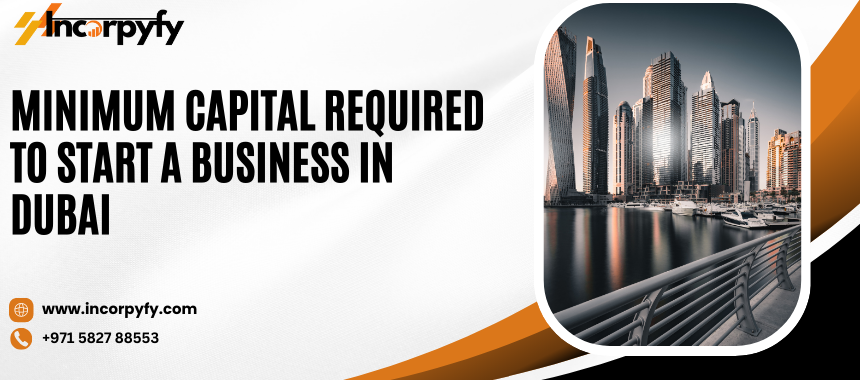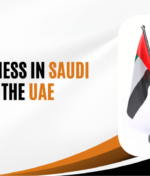
Launching a business venture in Dubai, a globally renowned hub for entrepreneurship and innovation, is an exciting opportunity for aspiring entrepreneurs. However, one of the critical factors to consider is the minimum capital requirement and minimum investment to start a business in Dubai, which varies depending on the type of business, industry, and legal structure chosen. In this comprehensive article, we will delve into the latest updates for 2024 and explore the minimum capital requirements to start a business in Dubai, catering to diverse entrepreneurial aspirations.
Understanding the Concept of Minimum Capital
Understanding the Concept of Minimum Capital Minimum capital, also known as share capital or startup capital, refers to the financial resources required to establish and legally operate a business in Dubai. This capital serves as a financial cushion, ensuring that the Company has sufficient funds to cover initial expenses, such as licensing fees, office setup costs, and operational expenses during the early stages of the business.
The minimum capital requirement is mandated by Dubai’s governing authorities, primarily the Department of Economy and Tourism (DET) and the various free zones within the emirate. These regulatory bodies have established specific guidelines and thresholds for minimum capital based on factors such as business activity, legal structure, and the location where the Company is to be established.
Importance of Meeting Minimum Capital Requirements
Importance of Meeting Minimum Capital Requirements Adhering to the minimum capital requirements is crucial for several reasons:
- Legal Compliance: Failure to meet the minimum capital requirements can result in rejecting your business license application or potential legal consequences for operating without proper compliance.
- Financial Stability: Adequate capital ensures that your business has the financial resources required to sustain operations during the initial phases, reducing the risk of financial distress or premature closure risk. Credibility and Investor Confidence: Meeting the minimum capital requirements demonstrates financial commitment and credibility, which can be beneficial when seeking external funding or attracting potential investors.
- Business Growth and Expansion: Having sufficient startup capital can provide the financial flexibility to explore growth opportunities, invest in resources, and adapt to changing market conditions.
It is essential to carefully assess and plan for the minimum capital requirements during the initial stages of your business planning process to ensure a smooth and successful launch.
Learn More: Company Setup in Dubai
Minimum Capital Requirements in Dubai Mainland
The DET determines the minimum capital requirements for businesses established in the Dubai mainland, which vary based on the Company’s legal structure and ownership.
Limited Liability Company (LLC)
- Sole Establishment (100% ownership by a single individual): AED 300,000 (approximately $81,700)
- Local Company (owned by UAE nationals or a company wholly owned by UAE nationals):
- No minimum capital requirement. Foreign Company (owned by non-UAE nationals): AED 300,000 (approximately $81,700)
Civil Company
- Professional Civil Company (e.g., legal consultancy, accounting, etc.)
- No minimum capital requirement. Non-Professional Civil Company: AED 300,000 (approximately $81,700)
Branch Office of a Foreign Company
- Branch Office: Minimum capital is determined based on the proposed business activities and the parent company’s financial standing. The DET may request audited financial statements or bank guarantees.
It’s important to note that these minimum capital requirements are subject to change. It’s advisable to consult with local authorities or professional service providers for the latest updates and specific requirements based on your business activities.
Minimum Capital Requirements in Free Zones
Dubai Multi Commodities Centre (DMCC)
The DMCC is a popular free zone for businesses in various sectors, including trade, services, and light manufacturing.
- DMCC Free Zone Company: AED 50,000 (approximately $13,600)
- DMCC Business Center Package: AED 20,000 (approximately $5,440)
Dubai International Financial Centre (DIFC)
The DIFC is a leading financial hub and free zone that caters to businesses in financial services, fintech, and related industries.
- DIFC Company: No minimum capital requirement, but adequate funds must be demonstrated based on the proposed business activities and operational expenses.
Dubai Silicon Oasis (DSO)
The DSO is a free zone focused on technology, electronics, and related industries.
- DSO Free Zone Company: AED 300,000 (approximately $81,700)
Dubai Airport Free Zone (DAFZA)
DAFZA is a strategic free zone located near Dubai International Airport. It is suitable for businesses involved in import, export, and logistics.
- DAFZA Free Zone Company: AED 1,000,000 (approximately $272,300)
Dubai Production City (IMPZ)
IMPZ is a free zone dedicated to media, production, and related industries.
- IMPZ Free Zone Company: AED 50,000 (approximately $13,600)
It’s important to note that these minimum capital requirements are subject to change. It’s advisable to consult with the respective free zone authorities or professional service providers for the latest updates and specific requirements based on your business activities and chosen free zone.
Factors Influencing Minimum Capital Requirements
While the legal structure and location are the primary determinants of minimum capital requirements, there are several other factors that may influence the specific amount required:
- Nature of Business Activity: Certain business activities, such as those involving high-risk or capital-intensive operations, may require higher minimum capital to ensure financial stability and compliance with industry-specific regulations.
- Number of Shareholders or Partners: In some cases, the minimum capital requirement may increase based on the number of shareholders or partners involved in the business.
- Projected Business Size and Growth Plans: Companies with ambitious growth plans or plans to operate on a larger scale may be required to maintain a higher minimum capital to support their expansion strategies.
- Special Licenses or Permits: Businesses requiring specialized licenses or permits, such as those in the healthcare, education, or construction sectors, may face additional minimum capital requirements imposed by the relevant regulatory bodies.
- Professional Requirements: Certain professions, such as law firms, accounting firms, or engineering consultancies, may have specific minimum capital requirements set by their respective governing bodies or professional associations.
Based on these factors, it’s crucial to consult with local authorities, free zone representatives, or professional service providers to understand the specific minimum capital requirements applicable to your business.
Strategies for Meeting Minimum Capital Requirements
Meeting the minimum capital requirements can be a significant challenge for aspiring entrepreneurs or business owners. Here are some strategies that can help you address this:
- Personal Savings or Family Support: If you have substantial personal savings or financial support from family members, you can use these funds to meet the minimum capital requirements.
- Bank Loans or Financing: Explore options for obtaining business loans or financing from banks or financial institutions in Dubai. Be prepared to provide a comprehensive business plan, financial projections, and collateral if required.
- Angel Investors or Venture Capital: Seek out angel investors or venture capital firms that specialize in providing seed funding or early-stage investments for startups in Dubai.
- Strategic Partnerships or Joint Ventures: Consider forming partnerships or joint ventures with established businesses or investors who can contribute to the required capital.
- Crowdfunding Campaigns: Leverage crowdfunding platforms to raise funds from a larger pool of potential investors or supporters who believe in your business idea.
- Incubators and Accelerators: Participate in business incubator or accelerator programs in Dubai, which can provide access to funding, mentorship, and other valuable resources to help you meet the capital requirements.
- Freelance Work or Consulting: Engage in freelance work or consulting services related to your expertise to generate additional income and gradually build up the necessary capital.
- Asset Liquidation: If you have valuable assets, such as real estate or investments, consider liquidating them to raise the required capital for your business venture.
It’s important to carefully evaluate the pros and cons of each strategy and seek professional advice to ensure compliance with local regulations and to make informed decisions about financing your business.
Alternatives to Meeting Minimum Capital Requirements
Sometimes, businesses may explore alternative options to the traditional minimum capital requirements. These alternatives can provide flexibility and cost-effective solutions, particularly for small or service-based businesses with minimal initial capital requirements.
Flexi Desk or Coworking Space Options
Several free zones and business centres in Dubai offer flexi desk or coworking space options, which allow businesses to operate without meeting the minimum capital requirements. These options typically involve renting a shared workspace or virtual office, providing a low-cost business setup in Dubai and cost-effective solutions for startups or small businesses with limited capital.
Examples of coworking spaces and flexi desk options in Dubai include:
DMCC Business Center DIFC Coworking Space Dubai Design District (D3) Coworking Space Dubai Internet City
Additionally, individuals interested in starting a business in UAE, including Indians looking to start a business in Dubai, may find these alternatives appealing for establishing a business in Dubai or setting up a business in Dubai with lower initial investments. These options can support entrepreneurs in navigating the process of starting a business in Dubai, UAE while aligning with their financial capabilities.





